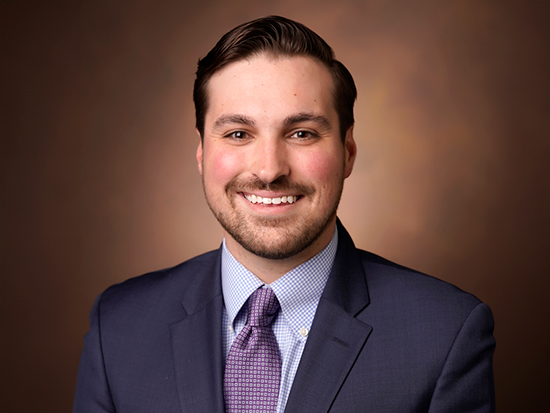 Andrew T. Hale, M.D., Ph.D., a neurological surgery resident in the University of Alabama at Birmingham Department of Neurosurgery, has been recognized as a Civitan Emerging Scholar for 2024-2025 by the Civitan International Research Center for his pioneering work in the field of hydrocephalus.
Andrew T. Hale, M.D., Ph.D., a neurological surgery resident in the University of Alabama at Birmingham Department of Neurosurgery, has been recognized as a Civitan Emerging Scholar for 2024-2025 by the Civitan International Research Center for his pioneering work in the field of hydrocephalus.
The Emerging Scholar Award provides research funding for clinical or basic science research related to brain development for trainees at the graduate student and postdoctoral fellow levels. Part of the Civitan International Research Center's mission is to foster the next generation of scientists studying brain development. The Emerging Scholars Awards are made possible by donations from Civitan International, matching funds from the Foundation for Children with Intellectual and Developmental Disabilities, and the UAB University-wide Interdisciplinary Research Centers (UWIRC) program.
Hydrocephalus is a condition caused by aberrant cerebrospinal fluid dynamics resulting in increased pressure. The condition can be genetic or acquired secondary to hemorrhage or infections, among other causes. Hydrocephalus can also lead to damage of brain tissue, causing a constellation of co-morbid neurologic disorders.
Hydrocephalus "is amongst the most common indication for brain surgery worldwide where development of effective pharmacologic treatments has been impeded by a lack of molecular and genetic understanding of the disease," says Hale.
However, a hopeful opportunity has recently surfaced. Induced pluripotent stem cells (iPSC) differentiated into small brain-like structures that are grown in lab dishes (i.e., cerebral organoids), are a new way to study the mechanisms of neurologic disease. Hale, alongside scientists and neurosurgeons at the University Cape Town Neuroscience Institute, University of Alabama at Birmingham, University of Cambridge, and Harvard, is hoping this technology may enable fundamental insights into hydrocephalus disease mechanisms and potentially treatment.
As an Emerging Scholar, Hale’s study will aim to create the first-ever cerebral organoid model of hydrocephalus, concentrating on creating models that reflect African ancestries, where hydrocephalus is most prevalent.
By generating cerebral organoids models of genetic and acquired hydrocephalus, Hale and his team are poised to define the mechanisms underlying the disease.
Driven by his dedication to pediatric neurosurgery, Hale chose to train at UAB “because of the diverse, high-volume clinical practice, excellence in basic/translational sciences, and particularly strong clinical training in pediatric neurosurgery.”
Hale also notes that “nearly 25% of pediatric neurosurgeons in the U.S. have trained at or been trained by graduates of UAB, including many departmental and national leaders.”
“Complementary to this, UAB is a leader in genomics and informatics, relevant to my specific scientific interests and background.”
In addition, UAB has a remarkable history of international collaboration and support of trainees pursuing international training opportunities, Hale says, making it the perfect place to pursue promising studies.
*Written by Mary Ashley Canevaro